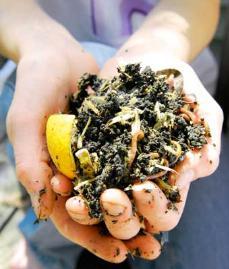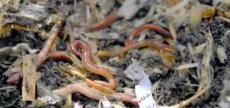When Rhonda Sherman came to the University as a solid waste extension specialist 13 years ago, she never expected to deal with worms.
Today she is a world-renowned expert in vermicomposting, or composting with worms, and has coached people from 41 countries on how to start and maintain their own vermicomposting operations.
On June 1 and 2, she will host the sixth annual worm farming workshop, “Vermicomposting around the World.” As the country’s only workshop for large-scale worm composting, the program is designed for entrepreneurs, institutions and businesses — but worms will compost for anybody, from hog farmers to city apartment-dwellers.
Worms consume anything organic, including paper, manure and food or yard waste. They devour half their body weight each day and rapidly convert smelly waste into a rich, pathogen-free soil amendment that promotes plant growth and health.
Waste from hog farms, for example, is often pooled in strong-smelling lagoons that may overflow or contaminate water supplies. Some hog farms, however, have enlisted worms to compost their manure.
They’ll spread the hog waste one inch thick in five-foot-wide, 200-foot-long worm beds, and the worms just go at it,” Sherman said. “Within 24 to 48 hours, there is hardly any odor, which is just amazing.”
Within a few months, the waste is high-quality compost that can be sold to gardeners and farmers to promote crop yield and soil health.
Vermicompost has this wonderful community of microorganisms that drive off plant disease,” Sherman said. “Growing plants in vermicompost has a dramatic effect on plant growth and decreases aphids, mealy bugs, spider mites and parasitic nematodes without pesticides.”
Brian Rosa, organics recycling specialist with the North Carolina Department of Environmental and Natural Resources, also touts the benefits of compost-associated bacteria.
“By using pesticides, herbicides and fertilizers we’ve eliminated a lot of things that used to be in the soil,” he said. “By reinoculating these aerobic microbes back into the soil with compost, we’re reestablishing a healthy soil community.”
All this makes worms very useful little animals for a society with growing solid waste problems.
In North Carolina, about three quarters of solid waste is organic, and about a quarter of it, or over 900,000 tons per year, is food waste that could be easily composted, according to the Web site of the North Carolina Division of Pollution Prevention and Environmental Assistance.
Not only does organic waste take up space in rapidly-filling landfills, it contributes to more widespread environmental problems.
“When you have organics in the landfill, they start reacting,” Sherman said. “Organics help release heavy metals from the waste around them, increasing the toxicity of the leachate coming out of the landfill. The organics also react to produce methane, which is explosive and a greenhouse gas.”
But when Sherman started her job as a solid waste extension specialist in the early ’90’s, nobody was talking about organics.
“Recycling was in,” she said. “Everybody was talking about glass and plastic, but those are a much smaller portion of the waste stream.”
Sherman saw a need to focus attention on organic waste, and the University was pressuring her to publish, so she came up with a pamphlet on vermicomposting.
I wrote a four page pamphlet called ‘Worms can recycle your garbage,’ Sherman said. “I was very eager to publish. I didn’t even have my own worm bin at the time, but the pamphlet flew off the shelves.”
Now, Sherman has a worm bin at home for her kitchen scraps, one in her office for coffee grounds and lunch scraps, and an elaborate composting demonstration site at the University Lake Wheeler Road Field Laboratory.
Over 85 percent of the calls she receives are about vermicomposting– large and small operations.
“It’s what captures the imagination,” she said. “People do get excited about worms.”
Like Sherman, Rosa has helped large-scale composters set up their ventures around the world. Most recently, he was invited to visit farming villages in Azerbaijan to help establish manure management, organic growing, vermicomposting and composting practices.
e also works with the Puerto Rico zoo to compost “giraffe crap and pachyderm poop.”
“I’d like more people to know about using composting in sewage and manure management,” Rosa said. “For example, Granville Township, Pennsylvania, has a vermicomposting system that handles 100 percent of the town’s municipal waste, 10 to 12 thousand pounds per day. Otherwise, that waste would be going to a landfill.”
But Rosa is quick to emphasize the importance of composting on a smaller scale as well.
The average backyard compost diverts about one-third of a ton of waste per year from the landfill,” he said. “If you get 10,000 households in a city doing that, it adds up.”
And thanks to worms, it doesn’t even take a backyard for a household to compost its organic waste.
Worms are perfect for the apartment-dweller,” Rosa said.
Bobby Tucker, a master’s student in biological and agricultural engineering, is one such apartment-dweller who sees vermicomposting as a step toward sustainable living.
It’s a lifestyle about producing as little waste as possible, about living simply,” he said. “I give my food scraps to my worms, which feed my soil to feed my plants to feed me. It’s a way to reduce our ecological footprint.”









